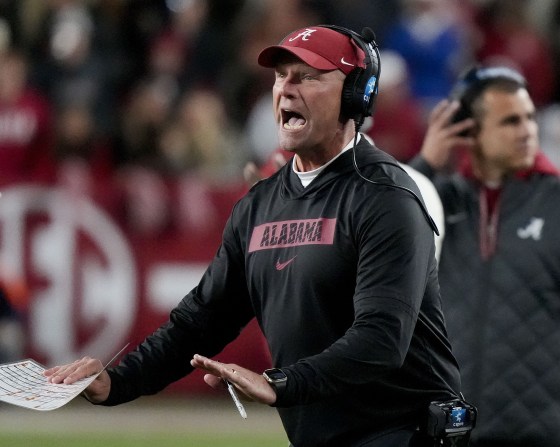Thanks to a 56-yard game-winning field goal as time expired in the ACC championship game, the College Football Playoff selection committee dodged controversy and produced a bracket that is as fair as any of us could have expected.
Do I have nits to pick? Of course I do. But thankfully the committee awarded SMU for making it to its conference championship game rather than punish it for losing. As I wrote late last week, the prospect of the committee rewarding a team that lost three games without making it to its conference championship game over another so-called Power 4 team with 10 wins seemed like a bad precedent to set. Clemson’s clutch kick made the debate moot.
Still, we are left wondering: Would the committee have been so generous to SMU had it not come back from a 17-point deficit to tie the game? The fact that the committee chair admitted the committee debated SMU’s losses to ranked teams vs. Alabama’s losses to unranked teams makes me wonder. So, too, does almost putting a nine-win SEC team in over an 11-win ACC team. It’s a bit distressing to fans of football programs not in the two largest conferences.
Had it picked Alabama over SMU, the unintended consequence would have simply been to end the conference championship games altogether. Why play in them if the risk isn’t worth the reward? Fortunately we avoided that scenario.
The question I have is whether the CFP is simply designed to reward the rich and powerful in the sport. I don’t ask it to troll. Every other league or entity that has expanded its playoff has done so to gain interest in the game beyond its usual dominant markets. Look at how the wild card expansion by MLB has improved local TV ratings for more baseball teams with chances to make the playoffs.
But the evidence so far is that this committee is going to continue to enhance the power and prestige of the SEC and the Big Ten. It did not go from four teams to 12 to expand the fan bases of college football as a whole.
If you watched the selection show, how often did you hear about the vaunted SEC schedule? While I’m well aware it’s difficult, so, too, are road conference games in every major conference. Try playing in Louisville, Kentucky, or Morgantown West Virginia, or Blacksburg, Virginia, at night. Boston College in November? Its turf is concrete when cold. Utah has one of the best home-field advantages in the entire sport. The SEC is not the only conference where it’s difficult to go unblemished.
Here’s what is true: The SEC football programs spend the most money, and they would never want to believe they aren’t the best given how much each program does spend. And their number of NFL first-round draft picks speaks for itself. But having the best players doesn’t always mean you have the best team. That’s the beauty of football — you can out-scheme and out-coach a faster and more physical team on any given Saturday.
This format will survive one more year for the 2025 season, and then the CFP folks are going to decide whether to keep it as is, shrink it (unlikely) or expand it (highly likely) starting with the 2026 season. More games is more money for everyone involved.
If they expand the playoff to 16, the big issue will be conference guarantees. Both the SEC and the Big Ten will want four slots each. That’s obviously not fair, but those two conferences have leverage, and I sure hope they go with merit. If it were fair, then it should be earned. Have the conferences ranked by strength of record at the end of the season and award 12 of the 16 slots based on those rankings.
For instance, under my plan, here’s what the 16-team playoff most likely would have looked like: You’d have the SEC earning a minimum of four slots (Georgia, Texas, Tennessee and Alabama), the Big Ten three slots (Oregon, Penn State and Ohio State), the ACC two slots (Clemson and SMU), the Big 12 one slot (Arizona State), the Mountain West one slot (Boise State) and the AAC one slot (Army).
That would leave four at-large bids, which, based on rankings, would be Notre Dame, Indiana, Miami and Ole Miss. I’m guessing the debate between Ole Miss and South Carolina would have been heated, and perhaps with a closer focus, the Gamecocks would have gotten the nod.
Here’s what the 16-team playoff would feature in the first round:
- 1. Oregon vs. 16. Army
- 2. Georgia vs. 15. Clemson
- 3. Texas vs. 14. Ole Miss
- 4. Penn State vs. 13. Miami
- 5. Notre Dame vs. 12. Arizona State
- 6. Ohio State vs. 11. Alabama
- 7. Tennessee vs. 10. SMU
- 8. Indiana vs. 9. Boise State
When you see how fantastic this slate looks at 16 teams, it’s easy to see that this is coming very soon. As long as the conference guarantees are based on merit, a 16-team playoff might finally end a majority of the griping we’ve dealt with for decades.
CORRECTION (Dec. 9, 2024, 11:40 p.m. ET): A previous version of this article misstated Blacksburg’s state. It is in Virginia, not West Virginia.

